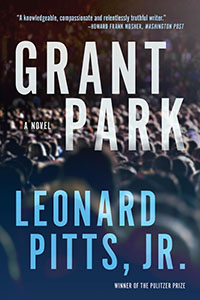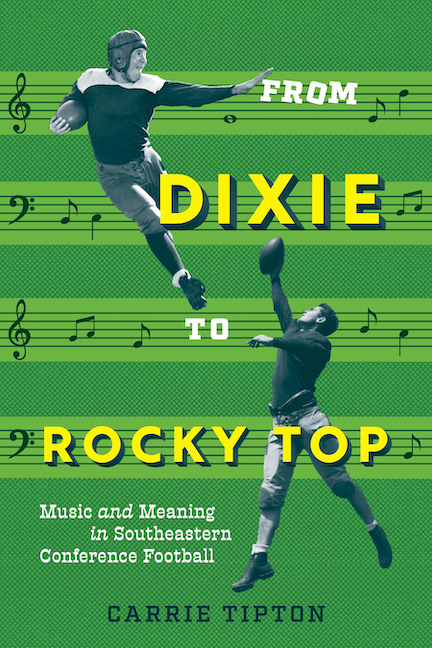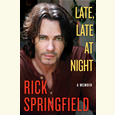War on Words
Violent extremists kidnap a newspaper columnist in Grant Park, a new novel by Leonard Pitts Jr.
Like the main character in his new novel Grant Park, Leonard Pitts Jr. is a Pulitzer Prize-winning columnist who confronts issues of social and racial justice: Pitts calls it “willful ignorance” when people like Mike Huckabee respond to the “Black lives matter” movement by arguing that “All lives matter,” and last year he skirmished with Bill O’Reilly of Fox News on the subject of white privilege.
 Pitts’s new novel, Grant Park, is a fast-paced, sometimes violent thriller that unfolds in Chicago during the presidential election of 2008, when a black newspaper columnist is kidnapped by white supremacists on the day the nation elects its first black president. But another story, this one about the 1968 sanitation-workers’ strike and Martin Luther King Jr.’s final days, unfolds in vivid detail in Memphis, in the memories of characters who are veterans of civil-rights protests. President-elect Obama makes a cameo, and King is a pivotal character in the novel, which includes both invented dialogue and language from historic speeches.
Pitts’s new novel, Grant Park, is a fast-paced, sometimes violent thriller that unfolds in Chicago during the presidential election of 2008, when a black newspaper columnist is kidnapped by white supremacists on the day the nation elects its first black president. But another story, this one about the 1968 sanitation-workers’ strike and Martin Luther King Jr.’s final days, unfolds in vivid detail in Memphis, in the memories of characters who are veterans of civil-rights protests. President-elect Obama makes a cameo, and King is a pivotal character in the novel, which includes both invented dialogue and language from historic speeches.
Pitts, whose previous novels include Freeman and Before I Forget, recently answered questions from Chapter 16 via email:
Chapter 16: In the parts of Grant Park that deal with the 1968 civil-rights struggle, you conjure scenes of Memphis at the time of the sanitation workers’ strike and the assassination of Martin Luther King Jr. Clearly this book required a good deal of research. In your acknowledgments, you credit authors and journalists who helped you imagine the setting. How did your own visits to contemporary Memphis inform the project?
Leonard Pitts Jr.: I had the good fortune to report from Memphis in 2008 on the fortieth anniversary of the sanitation workers’ strike. I was able to interview a number of the men who participated in the strike, and I think that played a great role in researching and shaping the novel. It certainly gave me valuable insight into the mindset of the men who endured the strike.
Chapter 16: In Becoming Dad, you write about your painful relationship with your abusive, alcoholic father. The flawed hero of Grant Park is also a “Junior,” a character who renames himself Malcolm Garvey Toussaint after three revolutionaries. But Toussaint’s father, a Memphis sanitation worker, is reliable and supportive. What was it like to create the fictional version of an ideal father?
 Leonard Pitts Jr.: Actually, I think that if you read it a little more closely you will find Malcolm’s father was reliably unsupportive. He was far from the ideal father—closed off and emotionally unavailable.
Leonard Pitts Jr.: Actually, I think that if you read it a little more closely you will find Malcolm’s father was reliably unsupportive. He was far from the ideal father—closed off and emotionally unavailable.
Chapter 16: Like the fictional Toussaint, you’re a Pulitzer Prize-winning columnist who writes about race and social justice. In the novel, you use a genuine message you once received—“Your [sic] such a racist nigger”—to illustrate one of the thousands of similarly “memorable missives” you’ve received in your own career. Have angry readers ever posed a threat to your safety, as they do to Toussaint?
Leonard Pitts Jr.: Not to the same degree, but I did have a series of death threats from white supremacists back about seven or eight years ago. That was interesting.
Chapter 16: In the novel, the video of a white supremacist’s rant is posted on a fictional Chicago newspaper’s website, and online commenters immediately begin hurling sarcastic and racist invective about a life-threatening situation. In your view, how has the movement to end anonymous comments on real-life news sites affected the atmosphere of public discourse?
Leonard Pitts Jr.: I think that for all its positive impact upon research and communication, the one drawback to the Internet in general and social media in particular is that they have empowered cowards under cover of anonymity to commit a kind of emotional terrorism and render reasoned debate not only impossible but also to make it seem quaint and effete. One of the best things my newspaper and others have done in the last few years is to require that people leave their names with their comments. This has a way of cutting down on the ad hominem obscenity and threats of violence without impacting spirited debate.
Chapter 16: President Obama’s 2008 election and an actual assassination plot against him are elements in Grant Park. The president also appears as a character in the novel. In straddling the worlds of journalism and fiction, especially in fiction that is fact-based, how do you find the right balance of each?
Leonard Pitts Jr.: Writing the president-elect was actually fairly easy because he is in our ears on a daily basis, so it wasn’t too challenging to mimic his speech patterns and demeanor. Dr. King was a whole ‘nother kettle of fish. Writing him was rather intimidating, and it took me a couple of drafts before I felt I had it right.
Chapter 16: In the novel, the columnist Toussaint sabotages his career because he’s “tired” of the slow progress of race relations in the United States. What’s your own opinion of the current state of race relations?
Leonard Pitts Jr.: Since the Civil War, the general pattern of African-American history has been two steps forward, one step back. I think that we are and have been for the last ten years or so in the midst of a giant step back.

Peggy Burch was books editor at The Commercial Appeal in Memphis for ten years, and she also worked as a deputy metro editor and Arts & Entertainment editor for the newspaper. She is a graduate of the Newhouse School of Public Communications at Syracuse University and holds a master’s degree in English literature from the University of Mississippi.





